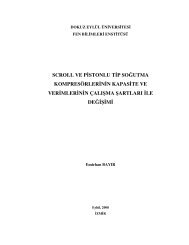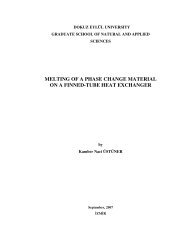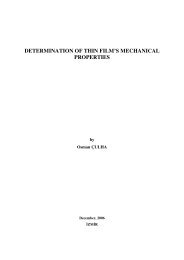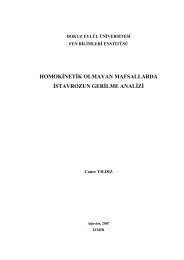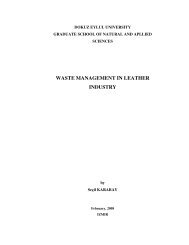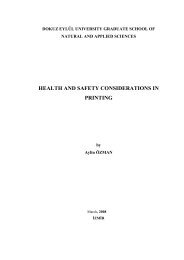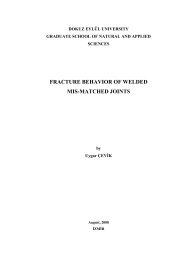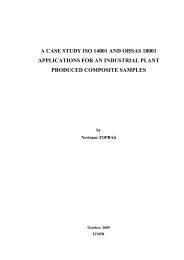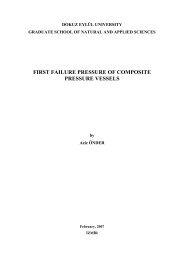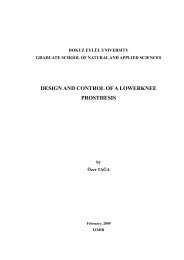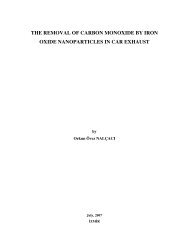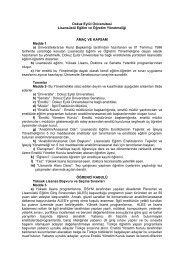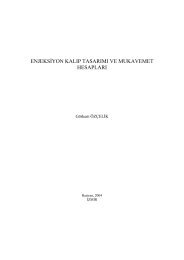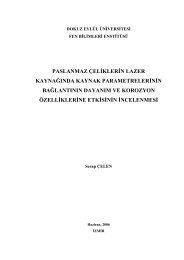Dokuz Eylül University Graduate School of Natural and Applied ...
Dokuz Eylül University Graduate School of Natural and Applied ...
Dokuz Eylül University Graduate School of Natural and Applied ...
You also want an ePaper? Increase the reach of your titles
YUMPU automatically turns print PDFs into web optimized ePapers that Google loves.
<strong>Dokuz</strong> <strong>Eylül</strong> <strong>University</strong><br />
<strong>Graduate</strong> <strong>School</strong> <strong>of</strong> <strong>Natural</strong> <strong>and</strong> <strong>Applied</strong> Sciences<br />
Department <strong>of</strong> Textile Engineering<br />
DEU Textile Engineering Department, which was founded in 1997, provides education with an<br />
academic staff <strong>of</strong> 7 pr<strong>of</strong>essors, 3 associate pr<strong>of</strong>essors, 1 assistant pr<strong>of</strong>essor, 2 lecturers, 14 research<br />
assistants <strong>and</strong> a specialist. Physical <strong>and</strong> chemical testing laboratories, clothing, knitting <strong>and</strong> weaving<br />
workshops, CAD laboratory, dyeing-finishing laboratory, comfort laboratory, <strong>and</strong> computerized knitting<br />
design laboratory exist in the department. The first graduates <strong>of</strong> the department are <strong>of</strong> 2001.<br />
Every year 60 students attend the education program in the department. After a preparation year for<br />
English language, the students take courses <strong>of</strong> basic engineering in addition to the courses <strong>of</strong> basic<br />
textiles in the first year <strong>of</strong> the program. By the end <strong>of</strong> the first year, the students attend workshop<br />
practices. With the start <strong>of</strong> the second year in the program, the detailed courses <strong>of</strong> textiles are given<br />
<strong>and</strong> by the end <strong>of</strong> the second <strong>and</strong> third years <strong>of</strong> the program the students attend pr<strong>of</strong>essional<br />
practices by working in vertically integrated textile factories.<br />
In the last year <strong>of</strong> the education program, in addition to the compulsory courses the students are able<br />
to choose courses from three selective groups <strong>of</strong> courses which are textile group, science/math group<br />
<strong>and</strong> social selective group. In this way the students are able to form the most appropriate course<br />
outline for themselves according to their interest areas.<br />
In the first year <strong>of</strong> the program the students take an English course to get acquaintance with the<br />
technical terms, <strong>and</strong> in the following years they take at least one course in English.<br />
In the department, programs <strong>of</strong> Textile Engineering Orientation, MSc <strong>and</strong> PhD in Textile Engineering<br />
are available in the framework <strong>of</strong> <strong>Graduate</strong> <strong>School</strong> <strong>of</strong> <strong>Natural</strong> <strong>and</strong> <strong>Applied</strong> Science.<br />
<strong>Graduate</strong> students are assigned in the sector <strong>of</strong> Textile <strong>and</strong> Apparel which is a running sector in terms<br />
<strong>of</strong> employment <strong>and</strong> production. The graduates find work opportunities in spinning, weaving, knitting,<br />
finishing <strong>and</strong> apparel factories, merch<strong>and</strong>ising companies <strong>of</strong> textile products, accessories <strong>and</strong><br />
machines, importing <strong>and</strong> exporting companies <strong>and</strong> textile laboratories.<br />
The main duties <strong>of</strong> textile engineers are production planning, organization, management at textile<br />
factories, design <strong>of</strong> textile product, managing projects <strong>of</strong> textile factories, the evaluation <strong>of</strong> usage <strong>of</strong><br />
textile products, giving education in textile companies. Textile engineers establish relations between<br />
the commercial textile companies <strong>and</strong> governmental <strong>and</strong> local institutions, management <strong>of</strong><br />
manufacturers <strong>of</strong> raw materials, machinery <strong>and</strong> spare parts.<br />
Besides the researches on basic textile engineering, DEU Textile Engineering Department focuses on<br />
researches <strong>of</strong> technical textiles such as smart textiles, functional textiles, textile composites, protective<br />
textiles, medical textiles, nanoparticulated fibre manufacturing, fabric h<strong>and</strong>le <strong>and</strong> clothing comfort,<br />
plasma, sol-gel <strong>and</strong> microcapsulation applications in finishing, simulation <strong>of</strong> knitted fabric appearance.<br />
Head <strong>of</strong> Department Pr<strong>of</strong>.Dr. Ayşe OKUR<br />
Deputy Head <strong>of</strong> Department Pr<strong>of</strong>.Dr. Sevil YEŞİLPINAR<br />
Deputy Head <strong>of</strong> Department Assoc.Pr<strong>of</strong>.Dr. Merih SARIIŞIK<br />
LLP Erasmus Program Coordinator Assoc.Pr<strong>of</strong>.Dr. Ender Yazgan BULGUN<br />
Telephone: + 90.232.4127701<br />
Fax: + 90.232.4127750<br />
E-mail: tekstilmuh@deu.edu.tr<br />
Postal Address: DEÜ Mühendislik Fakültesi<br />
Tekstil Mühendisliği Bölümü<br />
Tınaztepe Kampüsü<br />
35160 BUCA / İZMİR – TURKEY<br />
Web Address: http://web.deu.edu.tr/tekstil/index.htm
Academic Staff<br />
Pr<strong>of</strong>essors<br />
Name-Surname RESEARCH INTERESTS e-mail<br />
Knitting Technology, Textile<br />
Mechanisms, Optimization Methods, 3D<br />
arif.kurbak@deu.edu.tr<br />
Arif KURBAK<br />
Geometrical <strong>and</strong> Physical Modeling <strong>of</strong><br />
Knitted Fabrics, Simulation <strong>and</strong><br />
Animation Techniques, Technical<br />
Textiles, Textile Composites<br />
Yalçın BOZKURT<br />
Process Control in Yarn Factories, Yarn<br />
Technology<br />
yalcin.bozkurt@deu.edu.tr<br />
Clothing Technology, Clothing<br />
gulseren.kurumer@deu.edu.tr<br />
Gülseren KURUMER Machinery, Fashion Design, Organization<br />
<strong>and</strong> Planning in Clothing Factory<br />
Textile Raw Materials (<strong>Natural</strong> <strong>and</strong> nilufer.erdem@deu.edu.tr<br />
Nilüfer ERDEM<br />
Chemical Fibers), Textile Physics <strong>and</strong><br />
Microscopy, Textile Chemistry, Fibre <strong>and</strong><br />
Yarn Technology<br />
Physical <strong>and</strong> Mechanical Properties <strong>of</strong> ayse.okur@deu.edu.tr<br />
Ayşe OKUR<br />
Yarns <strong>and</strong> Fabrics, Fabric Objective<br />
Measurement, Clothing Comfort<br />
Fatma ÇEKEN<br />
Knitting Technology, Design for Knitted<br />
Fabrics, Automotive Textiles<br />
fatma.ceken@deu.edu.tr<br />
Sevil YEŞİLPINAR Clothing Technology, CAD Systems<br />
sevil.yesilpinar@deu.edu.tr<br />
Associate Pr<strong>of</strong>essors<br />
Name-Surname RESEARCH INTERESTS e-mail<br />
Merih SARIIŞIK<br />
Textile Pretreatment, Color Science,<br />
Textile Biotechnology<br />
merih.sariisik@deu.edu.tr<br />
Clothing Technology, Fashion Design, ender.bulgun@deu.edu.tr<br />
Ender Yazgan BULGUN<br />
Pattern Making <strong>and</strong> Grading, CAD<br />
Systems in Apparel Manufacturing,<br />
Smart Textiles <strong>and</strong> applications<br />
Assistant Pr<strong>of</strong>essors<br />
Name-Surname RESEARCH INTERESTS e-mail<br />
Textile Chemistry, Textile Finishing<br />
Treatments, Chemical Testing <strong>of</strong> Textile<br />
aysun.cireli@deu.edu.tr<br />
Aysun Cireli AKŞİT Materials, Protective Clothing, Surface<br />
Modification Techniques (Sol-gel,<br />
Plasma)<br />
Lecturers<br />
Name-Surname RESEARCH INTERESTS e-mail<br />
Vildan SÜLAR<br />
Physical testing <strong>of</strong> textiles, Fabric<br />
objective measurement, Textile<br />
quality control<br />
vildan.sular@deu.edu.tr<br />
Hakan ÖZDEMİR<br />
Weaving technology, Woven fabric<br />
design, Woven fabric simulation, Yarn<br />
technology<br />
h.ozdemir@deu.edu.tr
Research Assistants<br />
Name-Surname RESEARCH INTERESTS e-mail<br />
Musa KILIÇ<br />
Physical Textile Testing, Yarn Technology,<br />
Statistical Quality Control, Quality<br />
Function Deployment (QFD), Fuzzy Logic<br />
musa.kilic@deu.edu.tr<br />
Ozan KAYACAN Clothing Technology, Apparel Production<br />
<strong>and</strong> Management, Smart Garments<br />
ozan.kayacan@deu.edu.tr<br />
Özlem KAYACAN Knitting Technology, Computerized<br />
Pattern Design <strong>of</strong> Knitted Fabrics<br />
ozlem.bicer@deu.edu.tr<br />
Gülseren KARABAY Clothing Technology, Textile <strong>and</strong> Clothing<br />
Management<br />
gulseren.karabay@deu.edu.tr<br />
Bengi KUTLU<br />
Textile Chemistry, Textile Finishing<br />
Treatments, Thermal Protective Clothing,<br />
Plasma Treatments<br />
bengi.kutlu@deu.edu.tr<br />
Sibel KAPLAN Yarn Spinning Technologies, Objective<br />
Fabric Measurement Systems, Clothing<br />
Comfort<br />
sibel.kaplan@deu.edu.tr<br />
Ü.Halis ERDOĞAN <strong>Natural</strong> Fibers, Chemical Fibers,<br />
Geotextiles, Nano-composite Fibers<br />
umit.erdogan@deu.edu.tr<br />
Gökhan ERKAN Textile Chemistry, Textile Pretreatment,<br />
Textile Dyeing<br />
gokhan.erkan@deu.edu.tr<br />
Befru Turan<br />
Fabric Geometry, Woven Fabric Design, befru.turan@deu.edu.tr<br />
ERDOĞAN<br />
Woven Fabric Technology, Permeability<br />
Properties <strong>of</strong> Textiles<br />
Textile Chemistry, Textile Pretreatment, nurhan.onar@deu.edu.tr<br />
Nurhan Onar<br />
Textile<br />
Finishing, Coating, Sol-gel Technology,<br />
Conductive Textiles<br />
Ayşe Çelik<br />
BEDELOĞLU<br />
Photovoltaic Textiles (Flexible organic<br />
solar cell applications), Yarn<br />
Manufacturing Technologies , Conductive<br />
Filament Yarn Production<br />
ayse.celik@deu.edu.tr<br />
Gonca Balcı<br />
Physical Textile Testing, Textile Quality<br />
Control<br />
gonca.balci@deu.edu.tr<br />
Ali Serkan Soydan Knitting Technology ali.soydan@deu.edu.tr<br />
Bekir Yıldırım<br />
Woven Fabric Structures <strong>and</strong> Fabric<br />
Mechanics, Weaving Technology<br />
bekir.yildirim@deu.edu.tr<br />
Tuba ALPYILDIZ<br />
Knitting Technology, Geometrical <strong>and</strong><br />
Physical Modeling <strong>of</strong> Knitted Structures,<br />
Textile Reinforcement <strong>and</strong> Composites<br />
tuba.alpyildiz@deu.edu.tr
Course Plan <strong>of</strong> MSc/PhD Programs<br />
Autumn Term<br />
Course Code Course Name T P Sum ECTS<br />
STA 6043 C (PhD) Optimization Theory 3 0 3 7<br />
TKS 5001 Fibre <strong>and</strong> Yarn Mechanics 3 0 3 6<br />
TKS 5007<br />
Suni ve Sentetik Stapel Liflerinin Pamuklu<br />
Sisteminde Eğrilmesi<br />
3 0 3 6<br />
TKS 5009 Türk Yapağılarının Kalite Sınıflarının Belirlenmesi 2 1 2.5 6<br />
TKS 5013 Tekstil Ürünlerinde Düzgünsüzlük ve Hata Analizi 2 1 2.5 6<br />
TKS 5015 Liflerin Gördügü Zararlar ve Analiz Yöntemleri 2 2 3 8<br />
TKS 5017<br />
Tekstil ve Konfeksiyon İşletmelerinde Verimlilik<br />
Yükseltme Kriterleri<br />
2 0 2 6<br />
TKS 5019 Textile Composites 3 0 3 6<br />
TKS 5021<br />
Tekstil ve Konfeksiyonda Teknik Ürün Geliştirme<br />
Aracı Olarak Değer Analizinin Kullanımı<br />
2 1 2.5 6<br />
TKS 5023 İleri Terbiye Teknolojileri 2 2 3 8<br />
TKS 6001 Engineering Design <strong>of</strong> Textiles 2 2 3 6<br />
TKS 6005 Konfeksiyon İşletmelerinde Zayıf Nokta Analizleri 2 0 2 6<br />
TKS 6007 Computer Graphic Designs <strong>of</strong> Textile Structures 2 0 2 6<br />
TKS 6009 Objektif Kumas Ölçüm Teknolojisi 2 0 2 6<br />
MAT 5002 C (MSc) Numerical <strong>and</strong> Approximate Methods 3 0 3 7<br />
TKS 5096 C MSc Seminar 0 2 0 5<br />
TKS 5098 C MSc Research 2 0 0 10<br />
TKS 5099 C MSc Thesis 0 0 0 20<br />
TKS 6096 C Ph.D. Seminar 0 2 0 5<br />
TKS 6098 C Ph.D. Research 3 0 0 10<br />
TKS 6099 C Ph.D. Thesis 0 0 0 20<br />
(C: Compulsory)
Spring Term<br />
Course Code Course Name T P Sum ECTS<br />
TKS 5002 Fabric Mechanics 2 0 2 6<br />
TKS 5004 İplik/Dokuma İşletmelerinde Proses Kontrolü 3 0 3 6<br />
TKS 5006 Konfeksiyonda Uygulamalı İş Etüdü Teknikleri 2 1 2.5 6<br />
TKS 5008 Karmaşık Örme Kumaş Yapıları 2 0 2 6<br />
TKS 5010 Konfeksiyonda CAD/CAM Sistemleri 2 0 2 8<br />
TKS 5012 Further Analysis <strong>of</strong> Textile Mechanisms 4 0 4 8<br />
TKS 5014<br />
Lif ve Yüzey Kesit Özelliklerinin Çeşitli Mikroskop<br />
Teknikleri ile İncelenmesi<br />
2 2 3 6<br />
TKS 5016 Fonksiyonel Tekstiller 3 0 3 8<br />
TKS 6002 Dynamics <strong>of</strong> Textile Processes 3 0 3 8<br />
TKS 6004 Lif Strüktürleri 2 0 2 6<br />
TKS 6008 Renk Fiziği ve Tekstilde Uygulanması 2 0 2 6<br />
TKS 6014 Enzim Kimyasi veTekstilde Uygulanması 2 0 2 6<br />
TKS 6016<br />
Tekstil ve Konfeksiyon İşletmelerinde Analitik İş<br />
Değerlendirme<br />
2 0 2 6<br />
MAT 5002 C (PhD) Numerical <strong>and</strong> Approximate Methods 3 0 3 7<br />
TKS 5096 C MSc Seminar 0 2 0 5<br />
TKS 5098 C MSc Research 2 0 0 10<br />
TKS 5099 C MSc Thesis 0 0 0 20<br />
TKS 6096 C Ph.D. Seminar 0 2 0 5<br />
TKS 6098 C Ph.D. Research 3 0 0 10<br />
TKS 6099 C Ph.D. Thesis 0 0 0 20<br />
(C: Compulsory)<br />
Minimum credit requirement: 21<br />
Number <strong>of</strong> credit courses: 7
Course Code: TKS 5001 Course Title: Fibre <strong>and</strong> Yarn Mechanics<br />
Level: <strong>Graduate</strong> Semester: Fall ECTS Credit: 6<br />
Status: Elective Hours a week: (3+0) Total Class Hours: 14 weeks x 3h. = 42h.<br />
Instructor: Pr<strong>of</strong>. Dr. Güngör BAŞER Instruction Language: English<br />
PREREQUISITIES<br />
Intermediate level <strong>of</strong> calculus, knowledge <strong>of</strong> general mechanics <strong>and</strong> textile technology.<br />
DESCRIPTION<br />
Objectives: The course aims, at first, giving a deeper underst<strong>and</strong>ing <strong>of</strong> the elastic Properties <strong>of</strong> textile fibres. In<br />
the introduction <strong>of</strong> the geometric <strong>and</strong> elastic properties <strong>of</strong> yarns to students, the concept <strong>of</strong> theoretical model is,<br />
first, explained <strong>and</strong> then it is shown how these properties can be predicted from the fibre properties by analytical<br />
methods.<br />
Learning outcomes:<br />
This course aims at creating an underst<strong>and</strong>ing <strong>of</strong> fibre <strong>and</strong> yarn structure <strong>and</strong> also <strong>of</strong> their mechanical<br />
behaviour.<br />
To develop an ability to set up theoretical models.<br />
To train students to use scientific approach to solve practical problems.<br />
Contents: Introduction to Fibre Mechanics. An Outline <strong>of</strong> General, Theory <strong>of</strong> Elasticity. Tensile Properties <strong>of</strong><br />
Fibres. Creep <strong>and</strong> Relaxation. Simple Bending <strong>of</strong> Bars. Flexural Properties <strong>of</strong> Fibres. Simple Shear <strong>and</strong> Torsion<br />
<strong>of</strong> Cylindrical Bars. Torsional Properties <strong>of</strong> Fibres. Frictional Properties <strong>of</strong> Fibres.<br />
TEACHING AND LEARNING METHOS<br />
The principle method used is to give lectures in course topics <strong>and</strong> carry out discussions. Home works are<br />
also given to solve problems <strong>and</strong> prepare presentations on certain topics.<br />
TEXTBOOK<br />
Physical Properties <strong>of</strong> Textile Fibres, Morton, W. E., Hearle, J. W. S., The Textile Institute, Manchester, 1975<br />
Structural Mechanics <strong>of</strong> Yarns <strong>and</strong> Fabrics, Volume I, Hearle, J. W. S., Grosberg, P., Backer, S., Wiley<br />
Interscience, 1969<br />
ASSESSMENT<br />
Homework<br />
Oral presentation<br />
Midterm Exam<br />
Final exam<br />
6
Course Code: TKS 5002 Course Title: Fabric Mechanics<br />
Level: <strong>Graduate</strong> Semester: Spring ECTS Credit: 6<br />
Status: Elective Hours a week: (2+0) Total Class Hours: 14 weeks x 2h. = 28h.<br />
Instructor: Pr<strong>of</strong>. Dr. Güngör BAŞER Instruction Language: English<br />
PREREQUISITIES<br />
Intermediate level <strong>of</strong> calculus, knowledge <strong>of</strong> general mechanics <strong>and</strong> textile technology.<br />
DESCRIPTION<br />
Objectives: The course aims at introducing the geometrical structure <strong>and</strong> the mechanical behaviour <strong>of</strong> the<br />
woven <strong>and</strong> knitted fabrics.<br />
Learning outcomes:<br />
This course aims at creating an underst<strong>and</strong>ing <strong>of</strong> fabric structure <strong>and</strong> mechanical behaviour.<br />
To develop a concept <strong>of</strong> mechanical behaviour <strong>of</strong> fabric structures.<br />
Contents: Fabric Cover. Pierce’s Geometry <strong>of</strong> Plain Weave Woven Fabric. Geometry <strong>of</strong> Plain Knitted Fabric.<br />
Theory <strong>of</strong> Bending <strong>of</strong> Flexible Bars. Introduction to Elliptic Integrals Physical Model <strong>of</strong> a Plain Weave Woven<br />
Fabric. Physical Model <strong>of</strong> Weft Knitting Loop. Kurbak’s Model <strong>of</strong> the Knitting Loop. Ol<strong>of</strong>fson’s Geometric-<br />
Mechanic Model <strong>of</strong> a Plain Weave Fabric. Başer’s Plain Weave Fabric Geometry for Loomstate Fabric. Fabric<br />
Extension. Fabric Bending. Fabric Shear.<br />
TEACHING AND LEARNING METHOS<br />
The principle method used is to give lectures in course topics <strong>and</strong> carry out discussions. Home works are<br />
also given to solve problems <strong>and</strong> prepare presentations on certain topics.<br />
TEXTBOOK<br />
Structural Mechanics <strong>of</strong> Yarns <strong>and</strong> Fabrics Volume I, Hearle, J.W.S., Grosberg, P., Backer, S., Wiley-Inter-<br />
Science, 1969<br />
Love, A.E.H., A Treatise on the Mathematical Theory <strong>of</strong> Elasticity, Dover Publications, 1944<br />
Strength <strong>of</strong> Materials, Vol. I-II, Timoshenko, S., D.van Nostr<strong>and</strong> <strong>and</strong> Co. Inc. Princeton, 1956<br />
Tekstil Mekaniği II, Önder, E., İ.T.Ü. Yayını, 1995<br />
ASSESSMENT<br />
Homework<br />
Oral presentation<br />
Midterm Exam<br />
Final exam<br />
7
Course Code: TKS5004 Course Title: Process Control Techniques in Yarn <strong>and</strong> Fabric Production<br />
Level: <strong>Graduate</strong> Semester: Spring ECTS Credit:6<br />
Status: Elective Hours aweek: (3+0) Total Class Hours: 14 weeks x 3h. = 42h<br />
Instructor: Pr<strong>of</strong>. Dr. Yalçın BOZKURT Instruction Language: Turkish<br />
PREREQUISITES<br />
None<br />
DESCRIPTION<br />
Objectives: The course aims to indicate the on-line <strong>and</strong> <strong>of</strong>f-line process control systems that must be applied in<br />
factories to provide sufficient quality <strong>and</strong> efficiency.<br />
Learning outcomes:<br />
This course is expected to help the students to underst<strong>and</strong> the process control systems.<br />
To develop the students’ analytical abilities <strong>and</strong> ability to present <strong>and</strong> criticize arguments.<br />
To help the students to review the literatures about this subject.<br />
Contents: This course shows the logic <strong>and</strong> importance <strong>of</strong> process control. The course consists <strong>of</strong> process faults<br />
in yarn <strong>and</strong> fabric manufacturing factories, a system formation for the process control, getting information <strong>and</strong><br />
evaluating the process control. The course also discusses the points <strong>and</strong> frequency <strong>of</strong> the process control, raw<br />
material, machines <strong>and</strong> the optimization <strong>of</strong> the adjustments.<br />
TEACHING AND LEARNING METHODS<br />
The course is thought in a lecture, class presentation <strong>and</strong> discussion format. All class members are expected to<br />
attend <strong>and</strong> both the lecture <strong>and</strong> seminar hours <strong>and</strong> take part in the discussion sessions. Besides the taught lecture,<br />
presentations are to be prepared by the students assigned for that week <strong>and</strong> presented to open a discussion<br />
session.<br />
TEXT BOOK<br />
- Quality in staple Fibre Spinning, Hötteschwiller, H. Erbele.<br />
- Labor Harldbueh, Bühler, A.<br />
ASSESSMENT<br />
To be announced<br />
8
Course Code: TKS5006 Course Title: Advanced Work Study Technics<br />
Level: <strong>Graduate</strong> Semester: Spring ECTS Credit:6<br />
Status: Elective Hours a week: (2+1) Total Class Hours: 14 weeks x 3h. = 42h<br />
Instructor: Pr<strong>of</strong>. Dr. Gülseren KURUMER Instruction Language: Turkish<br />
PREREQUISITES<br />
Fundamental knowledge <strong>of</strong> work study technics, which are used in industrial systems, are required.<br />
DESCRIPTION<br />
Objectives: The course aims to provide an introduction to the basic elements <strong>of</strong> MTM method, to give a vision<br />
for planning <strong>and</strong> designing work stations, work flows, products, systems etc.<br />
Learning outcomes:<br />
This course is expected to help the students to appreciate the philosophy <strong>of</strong> well-performed man-machine<br />
system.<br />
To develop the students’ analytical abilities to improve the environmental working conditions.<br />
Contents: This course analyses; the human basic movements by time measurement, st<strong>and</strong>ard timetables for each<br />
action, comparing the action classes. The combination <strong>of</strong> the movements for the given examples, improvement<br />
<strong>of</strong> the commonly used methods by using MTM philosophical approach.<br />
Teaching <strong>and</strong> Learning Methods<br />
The course is taught in a lecture <strong>and</strong> practice format.<br />
Textbook<br />
Manuscripts prepared by instructor.<br />
Assessment<br />
One exam <strong>and</strong> a semester study<br />
9
Course Code: TKS5007 Course Title: Spinning <strong>of</strong> the Synthetic Fibers in Cotton System<br />
Level: <strong>Graduate</strong> Semester: Autumn ECTS Credit:6<br />
Status: Elective Hours a week:(3+0) Total Class Hours: 14 weeks x 3h. = 42h<br />
Instructor: Pr<strong>of</strong>. Dr. Yalçın BOZKURT Instruction Language: Turkish<br />
PREREQUISITES<br />
None<br />
DESCRIPTION<br />
Objectives: The course aims to indicate the spinning conditions <strong>and</strong> problems <strong>and</strong> also to discuss the<br />
suggestions for manufacturing <strong>of</strong> the synthetic yarns in Ring <strong>and</strong> O.E. Spinning Systems.<br />
Learning outcomes:<br />
This course is expected to help the students to underst<strong>and</strong> the short staple spinning technologies.<br />
To develop the students’ analytical abilities <strong>and</strong> ability to present <strong>and</strong> criticize arguments.<br />
To help the students to review the literatures about this subject.<br />
Contents: This course defines the spinning <strong>of</strong> the short staple synthetic fibers <strong>and</strong> consists <strong>of</strong> the manufacturing<br />
<strong>of</strong> PES, Acrylic <strong>and</strong> Viscose yarn. The course also discusses manufacturing <strong>of</strong> blended yarns <strong>and</strong> evaluating the<br />
efficiency in spinning process.<br />
TEACHING AND LEARNING METHODS<br />
The course is thought in a lecture, class presentation <strong>and</strong> discussion format. All class members are expected to<br />
attend <strong>and</strong> both the lecture <strong>and</strong> seminar hours <strong>and</strong> take part in the discussion sessions. Besides the taught lecture,<br />
presentations are to be prepared by the students assigned for that week <strong>and</strong> presented to open a discussion<br />
session.<br />
TEXT BOOK<br />
- Fundamentals <strong>of</strong> Spun Yarn Technology, Carl A. Lawrence, CRC Press, 2003.<br />
- Short Staple Yarn Manufacturing, McCreight, D.J., Feil,R.W., Booterbaugh, J.H., Backe, E.E. USA:<br />
Carolina Academic Pres., 1997.<br />
- Open-End İplik Teknolojisi, Cengiz Yapıcılar, İstanbul, 2005<br />
ASSESSMENT<br />
To be announced<br />
10
Course Code: TKS5008 Course Title: Complex Knitted Structures<br />
Level: <strong>Graduate</strong> Semester: Spring ECTS Credit: 6<br />
Status: Elective Hours a week: (2+0) Total Class Hour: 28<br />
Instructor: Pr<strong>of</strong>. Dr. Fatma Çeken Instruction language: Turkish<br />
PREREQUISITIES<br />
None<br />
DESCRIPTION<br />
Objectives: The course aims to examine knitting structures which are produced by different complicated besides<br />
the simple basic knitting techniques.<br />
Learning outcomes:<br />
Knitting structures which are produced with different techniques using single-bed knitting machines.<br />
(dropped stitch, transparent knits, structures produced by different types <strong>of</strong> yarns, etc.)<br />
Knitting structures which can be produced using double-bed knitting machine. (different jacquard<br />
techniques, relief patterns, spacer knitting structures, etc.)<br />
Knitting structures which are being used for technical textiles. (knitting structures used in the automotive<br />
industry, in coated fabrics, in active sports clothing, warp knitting structures used in geotextiles, b<strong>and</strong>ages,<br />
corsets, vessel <strong>and</strong> prosthesis applications, net structures used as the medical textiles, etc.)<br />
Contents:<br />
Technical analysis <strong>of</strong> warp <strong>and</strong> weft knitting structures<br />
TEACHİNG AND LEARNING METHODS<br />
Examining the structures by technical analysis (examination <strong>of</strong> the knitting notation, machine technology,<br />
special apparatus, properties <strong>of</strong> the knitting yarn) <strong>of</strong> knitting samples<br />
TEXTBOOK<br />
To be announced.<br />
ASSESMENT<br />
To be announced.<br />
11
Course Code: TKS 5009 Course Title: Determining the Quality Classification <strong>of</strong> Turkish Wools<br />
Level: <strong>Graduate</strong> Semester: Fall ECTS Credit:6<br />
Status: Elective Hours a week: (2+1) Total Class Hours: 14 weeks x 3h. = 42h<br />
Instructor: Pr<strong>of</strong>. Dr. Nilüfer ERDEM Instruction Language: Turkish<br />
PREREQUISITES<br />
None<br />
DESCRIPTION<br />
Objectives: The course aims to provide an introduction to definition <strong>of</strong> Turkish sheep <strong>and</strong> their wools,<br />
classification <strong>of</strong> sheep species according to their wool properties, <strong>and</strong> underst<strong>and</strong>ing <strong>of</strong> measurement <strong>and</strong> test<br />
methods for wool fibers.<br />
Learning outcomes:<br />
This course is expected to help the student to underst<strong>and</strong> the properties <strong>of</strong> wools <strong>of</strong> Turkish sheep.<br />
To develop the students’ analytical abilities <strong>and</strong> ability to present <strong>and</strong> criticize arguments.<br />
To help the student to review the literatures<br />
Contents: This course defines the classification <strong>of</strong> Turkish sheep according to their wool properties, wool<br />
properties <strong>of</strong> new species, properties <strong>and</strong> difference <strong>of</strong> carpet, rug <strong>and</strong> fabric wools, classification <strong>of</strong> wools in the<br />
world. The course also discuses the analysis <strong>of</strong> wools, measurement techniques for wool fiber etc.<br />
TEACHING AND LEARNING METHODS<br />
The course is thought in a lecture, class presentation <strong>and</strong> discussion format. All class members are expected to<br />
attend <strong>and</strong> both the lecture <strong>and</strong> seminar hours <strong>and</strong> take part in the discussion sessions. Besides the taught lecture,<br />
presentations are to be prepared by the students assigned for that week <strong>and</strong> presented to open a discussion<br />
session.<br />
TEXT BOOK<br />
Wool Science <strong>and</strong> Technology, SW Simpson <strong>and</strong> G Crawshaw Woodhead Publishing 2002<br />
Batı Anadolu’da Melezlemeyle Oluşturulan Başlıca Koyun Tiplerinin Yapağı ve Tops Özellikleri,<br />
Erdem, Nilüfer Yayın No: 2 DEÜ Tekstil Mühendisliği Bölümü, 1999<br />
ASSESSMENT<br />
To be announced<br />
12
Course Code: TKS 5010 Course Title: CAD/CAM IN CLOTHING INDUSTRY<br />
Level: <strong>Graduate</strong> Semester: Spring ECTS Credit: 8<br />
Status: Elective HoursAWeek: (2+0) Total Class Hours: 14 weeks x 2h. = 28h.<br />
Instructor: Pr<strong>of</strong>. Dr. Sevil Yesilpinar<br />
Assoc.Pr<strong>of</strong>. Dr. Ender Yazgan Bulgun<br />
Instruction Language: Turkish<br />
PREREQUISITIES<br />
Latest developments in 2 <strong>and</strong> 3 dimensional CAD systems, knowledge <strong>of</strong> CAD systems techniques.<br />
DESCRIPTION<br />
Objectives: The course aims to provide an introduction to 3D CAD Systems <strong>and</strong> underst<strong>and</strong>ing <strong>of</strong> the main<br />
techniques <strong>of</strong> pattern preparation in the computer.<br />
Learning outcomes:<br />
This course is expected to help the student how they can prepare garment patterns in the computer.<br />
To give the students further information on 3D CAD systems, Body scanners <strong>and</strong> Made-to-Measure Systems<br />
To give the students further information on cutters in CAD systems.<br />
Contents: This course analyses 2D <strong>and</strong> 3D CAD systems, basic principles <strong>of</strong> preparing garment patterns.<br />
The course discusses the relationship between 2D CAD systems <strong>and</strong> 3D CAD systems. In that course, latest<br />
developments in 2 dimensional <strong>and</strong> 3 dimensional CAD systems are explained.<br />
I this course content, M.T.M. (Made to Measure) systems, 3 dimensional body scanners, CAD systems in cutting<br />
room, CAD systems in sewing room are mentioned .<br />
TEACHING AND LEARNING METHOS<br />
The course is taught in a lecture, class presentation <strong>and</strong> discussion format. Besides the taught lecture, group<br />
presentations are to be prepared by the groups assigned for that week <strong>and</strong> presented to open a discussion<br />
session.<br />
TEXTBOOK<br />
CAD/CAM in Clothing And Textiles, Stephen Gray, 1998, Design Council, GoverPublishing Limited.<br />
CAD In Clothing <strong>and</strong> Textiles,Winifred Aldrich, 1992, BSP Pr<strong>of</strong>essional Books Limited.<br />
Computers ın The Fashion Industry, Patrick Taylor, 1990,Heinemann Pr<strong>of</strong>essional Publishing Limited.<br />
ASSESSMENT<br />
Homework<br />
Field Study<br />
Weekly Follow-up Reports<br />
Quiz<br />
Midterm Exam<br />
Final Exam<br />
Term Paper<br />
13
Course Code: TKS 5012 Course Title: Further Analysis Of Textile Mechanisms<br />
Level: <strong>Graduate</strong> Semester: Autumn ECTS Credit: 8<br />
Status: Elective Hours a week: (4+0) Total Class Hour: 56<br />
Instructor: Pr<strong>of</strong>.Dr.Arif KURBAK Instruction language: English<br />
PREREQUISITIES<br />
None<br />
DESCRIPTION<br />
Objectives <strong>and</strong> Learning outcomes: This course aims at giving, graduate students some more knowledge in<br />
textile mechanisms so that they can be able to appreciate the finer points <strong>of</strong> them <strong>and</strong> also they can be able to<br />
tackle more complicated engineering problems.<br />
Contents: Introduction To Mechanisms, Rigid Bodies (Links), Kinematic Pairs (Joints), Kinematic Chain,<br />
Kinematic Scheme, Machine, Frictional drives <strong>and</strong> their textile applications; (Transmission <strong>of</strong> rotational motion<br />
between two discs, Belt drives, Variable-speed friction drives), Positive drives (Roller chain drives, Gear drives,<br />
Simple gear trains, planetary gear trains, the differential gear), Additional topics on the cam mechanisms <strong>and</strong><br />
their textile applications, Classifications <strong>of</strong> cams, The linear <strong>and</strong> parabolic cams, The forces on the cam discs,<br />
The effect <strong>of</strong> friction on the cam load (this will be shown on knitting cam), The effect <strong>of</strong> linkage elasticity on the<br />
follower movement (this will be shown on the picking stick <strong>of</strong> a loom), Linkage Mechanisms, Basic<br />
Mechanisms (Four-Bar Mechanism , Grassh<strong>of</strong>f Criteria , Slider-Crank Mechanism, Inverted Slider -Crank<br />
Mechanism , etc.), Linkage Mechanisms, Motion analysis <strong>of</strong> linkage mechanism by the vector loop closure<br />
equation, The computer solutions <strong>of</strong> vector loop closure equations by Newton-Raphson Iteration Method,<br />
Velocity analysis <strong>of</strong> linkage mechanisms by differentiating <strong>of</strong> motion equations, Acceleration analysis <strong>of</strong> linkage<br />
mechanisms by differentiating <strong>of</strong> velocity equations<br />
TEACHİNG AND LEARNING METHODS<br />
The course is taught in a lecture, class presentation <strong>and</strong> discussion format. All class members are expected to<br />
attend <strong>and</strong> both the lecture <strong>and</strong> seminar hours <strong>and</strong> take part in the discussion sessions. Besides the taught lecture,<br />
group presentations are prepared by the groups <strong>and</strong> assigned for the week <strong>and</strong> presented to open a discussion<br />
session.<br />
TEXTBOOK<br />
Kurbak, A., Textile Machinery Mechanisms , Lecture Notes, 2004 .<br />
ASSESMENT<br />
To be announced.<br />
14
Course Code: TKS 5013 Course Title: Unevenness <strong>and</strong> Fault Analysis in Textiles<br />
Level: <strong>Graduate</strong> Semester: Autumn ECTS Credit: 6<br />
Status: Elective Hours a week: (2+1) Total Class Hours: 14 weeks x 3h. = 42h<br />
Instructor: Pr<strong>of</strong>. Dr. Ayşe OKUR Instruction Language: Turkish<br />
PREREQUISITES<br />
To have a principal knowledge <strong>of</strong> fibre <strong>and</strong> yarn properties <strong>and</strong> yarn producing processes.<br />
DESCRIPTION<br />
Objectives: The aim <strong>of</strong> this course is to give knowledge about the reasons <strong>of</strong> the unevenness <strong>and</strong> the faults that<br />
occur on textiles because <strong>of</strong> different reasons <strong>and</strong> to provide underst<strong>and</strong>ing <strong>of</strong> analyses <strong>and</strong> measurement <strong>and</strong><br />
evaluation methods <strong>and</strong> to explain the precautions that must be done to prevent these unevenness <strong>and</strong> faults.<br />
Learning outcomes:<br />
Contents:<br />
To give theoretical <strong>and</strong> practical knowledge that provides the ability <strong>of</strong> determination <strong>of</strong> the sources <strong>of</strong><br />
yarn unevenness <strong>and</strong> faults.<br />
To provide underst<strong>and</strong>ing <strong>of</strong> the relations between fibre properties <strong>and</strong> yarn unevenness <strong>and</strong> yarn faults.<br />
To provide making comparisons <strong>of</strong> measurement methods <strong>of</strong> yarn unevenness by thinking from<br />
different views.<br />
To direct the students to examine the precautions that must be taken to prevent fabric faults.<br />
To direct the students to think about the suitable approaches to evaluate the fabric quality objectively.<br />
Definition <strong>and</strong> importance <strong>of</strong> unevenness. Addition <strong>of</strong> irregularities throughout the spinning process. Theoretical<br />
limit for the irregularity <strong>of</strong> fibre assemblies. Analysis <strong>of</strong> yarn unevenness <strong>and</strong> faults. Measurement <strong>and</strong><br />
evaluation methods <strong>of</strong> yarn unevenness. Influence <strong>of</strong> periodic mass variations <strong>and</strong> faults on woven <strong>and</strong> knitted<br />
fabric appearance. Inspection, evaluation <strong>and</strong> classification <strong>of</strong> fabric faults.<br />
TEACHING AND LEARNING METHODS<br />
The course is taught by interactive methods <strong>and</strong> is supported by group studies <strong>and</strong> laboratory applications.<br />
TEXT BOOK<br />
To be announced.<br />
ASSESSMENT<br />
Homework<br />
Laboratory study<br />
Midterm exam<br />
Final exam<br />
15
Course Code: TKS5014<br />
Course Title: Investigation <strong>of</strong> Longitudinal <strong>and</strong> Cross-Sectional<br />
Properties <strong>of</strong> Fibers Using Microscope Techniques<br />
Level: <strong>Graduate</strong> Semester: Spring ECTS Credit: 6<br />
Status: Elective<br />
Hours a Week: (2+2) Total Class Hours: 14 weeks * 4h. = 56h.<br />
Instructor: Pr<strong>of</strong>. Dr. Nilüfer Erdem Instruction Language: Turkish<br />
PREREQUISITIES<br />
None<br />
DESCRIPTION<br />
Objectives: Longitudinal <strong>and</strong> cross-sectional appearance <strong>of</strong> fiber is examined using various microscope<br />
techniques such as Projection microscope, Photomicroscope, Polarized microscope <strong>and</strong> Electron<br />
microscopes). Preparation techniques are discussed for various microscopes.<br />
Learning outcomes:<br />
To improve practical skills <strong>of</strong> students in examination <strong>of</strong> longitudinal <strong>and</strong> cross-sectional appearance <strong>of</strong> fibers<br />
using various microscopes, thus identification <strong>and</strong> determination <strong>of</strong> differences <strong>of</strong> fibers, <strong>and</strong> using these<br />
techniques by researchers is aimed.<br />
Contents: Explanation <strong>of</strong> some microscope types (Photomicroscope, Scanning Electron Microscope (SEM),<br />
Polarized Microscope) <strong>and</strong> cross-section preparation techniques. Investigation <strong>of</strong> fiber cross-sectional <strong>and</strong><br />
longitudinal appearance <strong>and</strong> identification <strong>of</strong> characteristics <strong>of</strong> fibers using some microscope types.<br />
TEACHING AND LEARNING METHOS<br />
The course is taught in a lecture <strong>and</strong> laboratory practice. All class members are expected to learn principles<br />
<strong>and</strong> systems <strong>of</strong> microscope <strong>and</strong> preparation techniques <strong>and</strong> to fulfill these techniques in the laboratory.<br />
TEXTBOOK<br />
1. Tekstil Mikroskopisi, Yazıcıoğlu, G., E.Ü. Müh. Fakültesi Yayınları No:34, 1996<br />
2. Microscopy <strong>of</strong> Textile Fibers, Graves, P.H., Royal microscopical Society Microscopy H<strong>and</strong>books, 1995<br />
3. Atlas <strong>of</strong> Fibre Fracture <strong>and</strong> Damage to Textiles, Hearle, J.W.S., Lomas, B., Cooke, W.D., Woodhead<br />
Publishing/Textile Institute, 2nd ed., 1982<br />
4. Pratical Fiber Identification, Hall, D.M., Auburn <strong>University</strong>, 2nd ed., 1982<br />
5. Physical Principles <strong>of</strong> Electron Microscopy: An Introduction to TEM, SEM, <strong>and</strong> AEM, Egerton, R.F.,<br />
Springer, 2005<br />
6. Electron Microscopy <strong>and</strong> Analysis, Goodhew, P.J., third ed., Taylor&Francis, 2000<br />
7. Light <strong>and</strong> Electron Microscopy, Ed. Slayter, H.S., Cambridge <strong>University</strong> Pres, 1992<br />
ASSESSMENT<br />
- Midterm Exam<br />
- Final Exam<br />
- Lab. Study<br />
16
Course Code: TKS 5015 Course Title: Fiber Degradation <strong>and</strong> Assessment Methods<br />
Level: <strong>Graduate</strong> Semester: Autumn ECTS Credit: 8<br />
Status: Elective HoursAVeek:(2+2) Total Class Hours: 14 weeks * 4h.= 56h.<br />
Instructor:Assoc. Pr<strong>of</strong>. Dr. Merih Sariisik<br />
Assist. Pr<strong>of</strong>. Dr.Aysun Cireli Aksit<br />
Instruction Language: Turkish<br />
PREREQUISITIES<br />
None<br />
DESCRIPTION<br />
Objectives: The course aims to provide knowledge <strong>of</strong> degradation <strong>of</strong> textile materials, their mechanisms <strong>and</strong><br />
methods <strong>of</strong> assessing degradation.<br />
Learning outcomes:<br />
1. This course is expected to help the student to underst<strong>and</strong> degradation <strong>and</strong> mechanisms.<br />
2. To develop the students analytical abilities <strong>and</strong> ability to present <strong>and</strong> criticise arguments.<br />
3. To give the students methods <strong>of</strong> assessing degradation.<br />
Contents:<br />
- Definition <strong>of</strong> degradation<br />
- The importance <strong>of</strong> degradation<br />
- The causes <strong>of</strong> degradation<br />
- Degradation mechanisms (Mechanical, photo degradation, thermal, chemical, microbiological)<br />
- The effects <strong>of</strong> degradation (Mechanical, structural changes, morphology, visco-elasticity,<br />
degree <strong>of</strong> polymerization, weight loss, thermal curves, chemical effects)<br />
- Methods <strong>of</strong> assessing degradation (Mechanical, chemical, thermal, intrumental methods)<br />
- The reduction <strong>of</strong> degradation<br />
- The uses <strong>of</strong> degradation<br />
- The factors causing damages <strong>and</strong> degradation in the textile finishing mills<br />
TEACHING AND LEARNING METHOS<br />
The course is taught in a lecture, class presentation <strong>and</strong> discussion format. All class members are expected to<br />
attend <strong>and</strong> both the lecture <strong>and</strong> seminar hours <strong>and</strong> take part in the discussion sessions. Besides the taught<br />
lecture, group presentations are to be prepared by the groups assigned for that week <strong>and</strong> presented to öpen a<br />
discussion session.<br />
TEXTBOOK<br />
- Textile Degradation Textile Progress, Vol. 21, No:1/2, PW Harrison, 1991<br />
- Chemical Processing <strong>of</strong> Fibers <strong>and</strong> Fabric, Functional Finishes, Part A, A. M. Lewin, S. Sello, 1983<br />
- Tekstil Laboratuarı için Analitik Metodlar, İnci Orkun, SAGEM Yayinlari<br />
- Chemistry <strong>of</strong> Textile Industry, Carr. C. (ed.), 1995<br />
- Quality Assessment <strong>of</strong> Textiles, 1993, Mahal, K.<br />
ASSESSMENT<br />
- Lab. Study<br />
- Midterm Exam<br />
- Final Exam<br />
- Term Paper<br />
17
Course Code: TKS 5016 Course Title: Functional Textiles<br />
Level: <strong>Graduate</strong> Semester: Spring ECTS Credit: 8<br />
Status: Elective<br />
Hours a Week: (3+0) Total Class Hours: 14 weeks * 3h. = 42h.<br />
Instructor: Assoc. Pr<strong>of</strong>. Dr. Merih Sarıışık<br />
Assist. Pr<strong>of</strong>. Dr. Aysun Cireli Aksit<br />
PREREQUISITIES<br />
None<br />
DESCRIPTION<br />
Objectives: to teach properties, end-uses <strong>and</strong> test methods <strong>of</strong> functional textiles.<br />
Learning outcomes:<br />
This course is expected to teach functional textiles <strong>and</strong> their usage areas.<br />
Instruction Language: Turkish<br />
Contents: The functional textiles importance have been increasing rapidly in textile market because <strong>of</strong><br />
competition, <strong>and</strong> gaining added values, <strong>and</strong> increasing market share. The consumers’ dem<strong>and</strong>s are not only<br />
defined by aesthetic properties <strong>and</strong> also functional properties have been playing an increasing role. Medical<br />
textiles, defence industrial textiles, construction textiles, coated textiles, protective clothes, filtration textiles, <strong>and</strong><br />
textiles used in transportation <strong>and</strong> vehicles will be discussed in the course.<br />
TEACHING AND LEARNING METHOS<br />
The course is taught in a lecture, class presentation <strong>and</strong> discussion format. All class members are expected to<br />
design a functional textile material.<br />
TEXTBOOK<br />
1. Coated Fabrics Technology, Technomic Publishing Company,Inc.,U.S.A., 1985, ISBN: 87762-426-7<br />
2. Mattila, H.R., Intelligent Textiles <strong>and</strong> Clothing, The Textile Institute, Woodhead Publishing Limıted,<br />
Engl<strong>and</strong><br />
3. Sen, A. K., Tech, M, 2001. Coated Textiles, Principles And Applications, Technical, Editor John<br />
Damewood, ISBN: 1-58716-023-4.<br />
4. Tao, X., Smart Fibres, Fabrics <strong>and</strong> Clothing, Woodhead Publishing Limited, Engl<strong>and</strong>, 2001, ISBN: 0-<br />
8493-1172-1<br />
5. Horrocks, A.R., An<strong>and</strong>, S.C., H<strong>and</strong>book <strong>of</strong> Technical Textiles, Woodhead Publishing Limited,<br />
Engl<strong>and</strong>, 2000- ISBN: 1-85573-385-4<br />
6. Raheel, M., Protective Clothing Systems <strong>and</strong> Materials, Marcel Dekker,Inc., New York, 1994, ISBN:0-<br />
8247-9118-5<br />
7. An<strong>and</strong>, S.C., Kennedy,J.F., Miraftab,M., Rajendran,S., Medical Textiles <strong>and</strong> Biomaterials for<br />
Healthcare, Woodhead Publishing Limited, Engl<strong>and</strong>, 2006, ISBN: 1-85573-683-7<br />
8. An<strong>and</strong>, S.C., Medical Textiles, Woodhead Publishing Limited, Engl<strong>and</strong>, 2001, ISBN: 1-85573-494X<br />
ASSESSMENT<br />
- Midterm Exam<br />
- Final Exam<br />
- Term Paper<br />
18
Course Code: TKS5017 Course Title: Productivity Criteria for Textile <strong>and</strong> Clothing Industry<br />
Level: <strong>Graduate</strong> Semester: Fall ECTS Credit:6<br />
Status: Elective Hours a week: (2+0) Total Class Hours: 14 weeks x 2h. = 28h<br />
Instructor: Pr<strong>of</strong>. Dr. Gülseren Kurumer Instruction Language: Turkish<br />
PREREQUISITES<br />
None<br />
DESCRIPTION<br />
Objectives: The lecture aims at increasing the productivity in textile <strong>and</strong> Clothing industries. Objective is to<br />
equip the students with the necessary background <strong>of</strong> this aim.<br />
Learning outcomes:<br />
This course will recognize the factors affecting the productivity.<br />
The students will be aware <strong>of</strong> the use <strong>of</strong> these factors<br />
The student will have the tools to control these.<br />
Contents:<br />
Definition, scope the importance <strong>of</strong> the productivity <strong>and</strong> factors affecting it.<br />
Production mediums<br />
Labor <strong>and</strong> manager<br />
Principles <strong>of</strong> work <strong>and</strong> technology<br />
Medium <strong>of</strong> workplace <strong>and</strong> management<br />
Flowsheet <strong>of</strong> working<br />
Payment systems<br />
Supply <strong>of</strong> raw material <strong>and</strong> accessories<br />
Construction <strong>of</strong> products<br />
Planning <strong>and</strong> production control<br />
Work-induced illnesses absence <strong>of</strong> worker <strong>and</strong> circulation <strong>of</strong> work-place.<br />
Technical problems <strong>and</strong> failer products.<br />
TEACHING AND LEARNING METHODS<br />
Theoretical teaching by the instructor.<br />
TEXT BOOK<br />
Manuscript von Pr<strong>of</strong>. Löcker A. Mönchengladbach, Germany.<br />
Manuscript von Pr<strong>of</strong>. Dr. Mustafa Nazmi Ercan, DEÜ, IZMIR.<br />
ASSESSMENT<br />
Two midterm-examinations followed by a final examination which involves 50% share <strong>of</strong> each.<br />
19
Course Code: TKS 5019 Course Title: Textile Composites<br />
Level: <strong>Graduate</strong> Semester: Autumn ECTS Credit: 6<br />
Status: Elective Hours a week: (3+0) Total Class Hours: 42h.<br />
Instructor: Pr<strong>of</strong>. Dr. Arif Kurbak Instruction Language: English<br />
PREREQUISITIES<br />
None.<br />
DESCRIPTION<br />
Objectives: The course aims to provide an introduction to the textile composites by examining the textile<br />
reinforcements, resins <strong>and</strong> manufacturing methods, also the applicaiton areas <strong>of</strong> the textile composites.<br />
Learning outcomes:<br />
1. This course is expected to help the textile engineering students to underst<strong>and</strong> the textile structures’<br />
behaviours <strong>and</strong> applications in the composites. With the background built with this course, the<br />
student will be able to go on further studies related with composites.<br />
2. This course is expected to help the students <strong>of</strong> engineering departments other than textile<br />
engineering to learn about the textile structures <strong>and</strong> their behaviours, so that they can combine<br />
textile structures with other engineering fields.<br />
Contents: This course gives a general overview <strong>of</strong> the textile composites, analyses the behaviour <strong>and</strong> the<br />
structure <strong>of</strong> textile reinforcements <strong>and</strong> the application areas. Examples <strong>of</strong> studies about the textile composites are<br />
given <strong>and</strong> discussed.<br />
TEACHING AND LEARNING METHODS<br />
The course is taught in a lecture, class presentation <strong>and</strong> discussion format. All class members are expected to<br />
attend the lecture hours <strong>and</strong> take part in the discussion sessions.<br />
TEXTBOOK<br />
To be announced.<br />
ASSESSMENT<br />
- Homework<br />
- Midterm Exam<br />
- Final Exam<br />
20
Course Code:TKS5021<br />
Course Title: Value Analysis as a Product Development Tool in Textile <strong>and</strong><br />
Clothing Industry.<br />
Level: <strong>Graduate</strong> Semester: Autumn ECTS Credit: 6<br />
Status: Elective HoursAWeek:(2+1) Total Class Hours: 14 weeks * 3h.= 42h.<br />
Instructor: Pr<strong>of</strong>. Dr. Gülseren Kurumer Instruction Language: Turkish<br />
Prerequisities:<br />
None<br />
DESCRIPTION:<br />
Objectives : The course aims to introduce the general principles <strong>of</strong> value analysis,The connotation <strong>of</strong> Value<br />
<strong>and</strong> the application fields <strong>of</strong> value analysis.<br />
Learning outcomes:<br />
This Course aims to bring in skill by using Value analysis method at design stage <strong>of</strong> a textile <strong>and</strong> ready wear<br />
product.<br />
Contents:<br />
The meaning <strong>of</strong> product Value, The terms <strong>of</strong> value analysis,The main steps <strong>of</strong> Value Analysis,<br />
Steps <strong>of</strong> Workplan.Tecnics <strong>of</strong> Value analysis <strong>and</strong> examples from different fields.<br />
Teaching <strong>and</strong> Learning Methods:<br />
The principle method is to give lecture in course Topics.Literature survays <strong>and</strong> presantation on certain topics are<br />
given for underst<strong>and</strong>ing the using fields <strong>of</strong> value analyses.<br />
Text Book:<br />
L.D.Miles, “Value Engineering”.Verlag Moderne İndustrie 3.Auflage 1969.<br />
Karl Hans Demmer, “ Aufgaben und Praxis <strong>of</strong> Werth Analyse”.Verlag Moderne İndustrie,1970.<br />
Christmann Kurt, “ Gewinnverbesserung durch Werthanalyse”. 1973.<br />
Assesment:<br />
Homework<br />
Oral presantation<br />
Final Exam.<br />
21
Course Code: TKS 5023 Course Title: Advanced Finishing Technology<br />
Level: <strong>Graduate</strong> Semester: Autumn ECTS Credit: 8<br />
Status: Elective<br />
Hours a Week: (2+2) Total Class Hours: 14 weeks * 4h. = 56h.<br />
Instructor: Assoc. Pr<strong>of</strong>. Dr. Merih Sarıışık<br />
Assist. Pr<strong>of</strong>. Dr. Aysun Cireli Aksit<br />
PREREQUISITIES<br />
None<br />
DESCRIPTION<br />
Objectives: to discuss <strong>and</strong> investigate new techniques in textile finishing.<br />
Learning outcomes:<br />
Instruction Language: Turkish<br />
To aim teaching principles <strong>of</strong> advanced finishing technologies <strong>and</strong> improving practical skills <strong>of</strong> students<br />
Contents: Despite <strong>of</strong> conventional techniques, many new technologies has been developed in textile finishing.<br />
Most important advantages <strong>of</strong> these techniques are saving <strong>of</strong> energy, water <strong>and</strong> chemicals by using minimum<br />
application <strong>and</strong> great diffusion. Also homogeneous <strong>and</strong> micro level operation can be achieved by these<br />
techniques. Thus textile materials gain different end uses. Nanotechnology, plasma technology, sol-gel<br />
technology <strong>and</strong> microencapsulation technology will be discussed in this course.<br />
TEACHING AND LEARNING METHOS<br />
The course is taught in a lecture <strong>and</strong> laboratory practice. All class members are expected to learn principles<br />
<strong>and</strong> systems <strong>of</strong> advanced finishing techniques <strong>and</strong> to fulfill these techniques in the laboratory.<br />
TEXTBOOK<br />
ASSESSMENT<br />
1. Pierre, A.C., Introduction to Sol-gel Processing, Kluwer Academic Publishers, 1998,<br />
Massachusetts, USA<br />
2. Brinker, C.J., Scherer, G.W., Sol-gel Science, The Physics <strong>and</strong> Chemistry <strong>of</strong> Sol-gel Processing,<br />
Academic Pres, 1990, San Diego, California<br />
3. Jolivet, J.P., Henry, M., Livage, J., Besche, E., Metal Oxide Chemistry <strong>and</strong> Synthesis, From<br />
Solution to Solid State, John Wiley & Sons, Ltd., 2003, London, UK, ISBN: 0471970565<br />
4. Coated Fabrics Technology, Technomic Publishing Company,Inc.,U.S.A., 1985, ISBN: 87762-<br />
426-7<br />
5. Mattila, H.R., Intelligent Textiles <strong>and</strong> Clothing, The Textile Institute, Woodhead Publishing<br />
Limıted, Engl<strong>and</strong><br />
6. Benita, S., Microencapsulation, Marcel Dekker, Inc.,U.S.A., 1996, ISBN:0-8247-9703-5<br />
7. Sen, A. K., Tech, M, 2001. Coated Textiles Principles And Applications, Technical Editor John<br />
Damewood, ISBN : 1-58716-023-4.<br />
8. Inagaki, N. “Plasma Surface Modification <strong>and</strong> Plasma Polymerization”, 1996, Lancaster-<br />
Pensilvania (USA): Technomic Publishing Company, Inc., ISBN 1-56676-337-1<br />
- Midterm Exam<br />
- Final Exam<br />
- Lab. Study<br />
- Term paper<br />
22
Course Code: TKS 6001 Course Title: Engineering Design <strong>of</strong> Textiles<br />
Level: <strong>Graduate</strong> Semester: Fall ECTS Credit: 6<br />
Status: Elective Hours a week: (2+2) Total Class Hours: 14 weeks x 4h. = 48h.<br />
Instructor: Pr<strong>of</strong>. Dr. Güngör BAŞER Instruction Language: English<br />
PREREQUISITIES<br />
Knowledge <strong>of</strong> textile technology.<br />
DESCRIPTION<br />
Objectives: This course aims at building, first, mathematical synthesis <strong>and</strong> optimization concepts for the<br />
solution <strong>of</strong> design problems, secondly, having introduced basic principles in the design <strong>of</strong> fabrics <strong>and</strong> garments.<br />
Learning outcomes:<br />
This course aims at creating an underst<strong>and</strong>ing <strong>of</strong> design approach.<br />
To develop a systematic application <strong>of</strong> design principles.<br />
To develop practical skill in computer applications for textile design.<br />
Contents: Theory <strong>of</strong> Design. Design <strong>of</strong> Yarns to Fulfil Performance Requirements. Engineering Design <strong>of</strong><br />
Single Woven Fabrics: Physical Design. Aesthetic Design Engineering Design <strong>of</strong> Figured Woven Fabrics.<br />
Engineering Design <strong>of</strong> Double Woven Fabrics. Linear Programming Methods <strong>Applied</strong> to Design <strong>of</strong> Fabrics.<br />
Principles <strong>of</strong> Garment Design: Basic Principles <strong>of</strong> Pattern Making. St<strong>and</strong>ardization <strong>of</strong> Body Measurements <strong>and</strong><br />
its Implementation in Garment Production. Computer Applications.<br />
TEACHING AND LEARNING METHOS<br />
The principle method used is to give lectures in course topics <strong>and</strong> carry out discussions. Home works are<br />
also given to prepare design solutions <strong>and</strong> computer programmes.<br />
TEXTBOOK<br />
Advanced Textile Design, Watson, W., Longmans, Green <strong>and</strong> Co., London, 1956<br />
Dokuma Tekniği ve Sanatı Cilt II: Dokuma Kumaş Tasarımı, Başer, G., Punto Yayıncılık, İzmir, 2005<br />
ASSESSMENT<br />
Homework<br />
Midterm Exam<br />
Final exam<br />
23
Course Code: TKS 6002 Course Title: Dynamics <strong>of</strong> Textile Processes<br />
Level: <strong>Graduate</strong> Semester: Spring ECTS Credit: 8<br />
Status: Elective Hours a week: (3+0) Total Class Hours: 14 weeks x 3h. = 42h.<br />
Instructor: Pr<strong>of</strong>. Dr. Güngör BAŞER Instruction Language: English<br />
PREREQUISITIES<br />
Intermediate level <strong>of</strong> calculus, knowledge <strong>of</strong> general mechanics <strong>and</strong> textile technology.<br />
DESCRIPTION<br />
Objectives: Dynamical aspects <strong>of</strong> carding <strong>and</strong> drawing based on statistical mechanics <strong>and</strong> those <strong>of</strong> spinning,<br />
weaving <strong>and</strong> knitting processes based on geometrical models, will be introduced. The course also aims at<br />
showing how textile processes are controlled by automatic control systems.<br />
Learning outcomes:<br />
This course aims at creating an underst<strong>and</strong>ing <strong>of</strong> basic yarn <strong>and</strong> fabric manufacturing processes.<br />
To develop an ability to analyse textile processes by applying mathematical methods.<br />
To train students to use scientific approach to solve practical problems.<br />
Contents: Theories <strong>of</strong> Yarn Formation: Drafting Theory. Theory <strong>of</strong> Carding. Dynamics <strong>of</strong> the Spinning<br />
Balloon. Analysis <strong>of</strong> Yarn Irregularity. Theories <strong>of</strong> Fabric Formation: Greenwood’s Theory <strong>of</strong> Fabric Formation.<br />
Dynamics <strong>of</strong> the Knitting Action. Plate’s Theory <strong>of</strong> Fabric Formation. Automatic Control <strong>of</strong> Textile Processes:<br />
Control in Drafting. Control <strong>of</strong> the Carding Process. Control in Sizing. Control in Weaving.<br />
TEACHING AND LEARNING METHOS<br />
The principle method used is to give lectures in course topics <strong>and</strong> carry out discussions. Home works are<br />
also given to solve problems.<br />
TEXTBOOK<br />
Textile Engineering Processes, Nissan, A.H. Butterworths, Scientific Publications, London ,1959<br />
Principles <strong>of</strong> Weaving, Marks, R., Robinson, A.T.C., The Textile Institute, Manchester, 1976<br />
Yarn Production Theoretical Aspects, Grosberg, P., Iype, C., The Textile Institute, 1999<br />
ASSESSMENT<br />
Homework<br />
Midterm Exam<br />
Final exam<br />
24
Course Code: TKS6004 Course Title: Structure <strong>of</strong> Fibers<br />
Level: <strong>Graduate</strong> Semester: Spring ECTS Credit:6<br />
Status: Elective Hours a week: (2+0) Total Class Hours: 14 weeks x 2h. = 28h<br />
Instructor: Pr<strong>of</strong>. Dr. Nilüfer ERDEM Instruction Language: Turkish<br />
PREREQUISITES<br />
None<br />
DESCRIPTION<br />
Objectives: The course aims to provide an introduction to definition <strong>and</strong> fine structure <strong>of</strong> natural, regenerated<br />
<strong>and</strong> chemical fibers, <strong>and</strong> underst<strong>and</strong>ing <strong>of</strong> physical, chemical <strong>and</strong> morphological structures <strong>of</strong> fibers, analysis<br />
techniques such as X-ray diffraction, IR- spectra photometry etc.<br />
Learning outcomes:<br />
This course is expected to help the student to underst<strong>and</strong> the fine structures <strong>of</strong> textile fibers.<br />
To develop the students’ analytical abilities <strong>and</strong> ability to present <strong>and</strong> criticize arguments.<br />
To help the student to review the literatures<br />
Contents: This course defines natural, regenerated <strong>and</strong> chemical fibers. The course consists <strong>of</strong> definition <strong>of</strong><br />
polymer, polymerization reactions, molecular orientation <strong>of</strong> fibers, anisotropy <strong>and</strong> birefringence in fibers,<br />
amorphous <strong>and</strong> crystalline structure <strong>of</strong> fibers. The course also discuses the analysis <strong>of</strong> fine structure <strong>of</strong> textile<br />
fibers with X-ray diffraction, IR- spectra photometry, differential thermal analysis etc.<br />
TEACHING AND LEARNING METHODS<br />
The course is thought in a lecture, class presentation <strong>and</strong> discussion format. All class members are expected to<br />
attend <strong>and</strong> both the lecture <strong>and</strong> seminar hours <strong>and</strong> take part in the discussion sessions. Besides the taught lecture,<br />
presentations are to be prepared by the students assigned for that week <strong>and</strong> presented to open a discussion<br />
session.<br />
TEXT BOOK<br />
Physical Properties <strong>of</strong> Textile Fibres Morton, W.E. <strong>and</strong> Hearle, J.W.S. The Textile Institute 3 rd Ed 1993<br />
Tekstil Fiziği, Aslı Hockenberger, Alfa Basım Yayın- İstanbul 2004<br />
ASSESSMENT<br />
To be announced<br />
25
Course Code: TKS6005 Course Title: Weak Point Analyses<br />
Level: <strong>Graduate</strong> Semester: Fall ECTS Credit:6<br />
Status: Elective Hours a week: (2+0) Total Class Hours: 14 weeks x 2h. = 28h<br />
Instructor: Pr<strong>of</strong>. Dr. Gülseren KURUMER Instruction Language: Turkish<br />
PREREQUISITES<br />
Fundamental knowledge <strong>of</strong> operating <strong>and</strong> managing systems.<br />
DESCRIPTION<br />
Objectives: The course aims to analyze the probable weakness in an enterprise with the point <strong>of</strong> 4M (Man-<br />
Machine Material, Method)<br />
Learning outcomes:<br />
This course is expected to help the students to gain a vision about the defects or organizations in the whole<br />
system with aspect <strong>of</strong> Machine, Material, Man <strong>and</strong> Method.<br />
Contents:<br />
This course<br />
analyses the probable weak points which could be occurred in<br />
Man<br />
Machine<br />
Material<br />
Method<br />
analyses the causes <strong>of</strong> a designated problem<br />
proposes the solutions for the different problems<br />
Teaching <strong>and</strong> Learning Methods<br />
The course is taught in a lecture <strong>and</strong> discussion format.<br />
Textbook<br />
Manuscripts prepared by instructor. Literature surveys, prepared by the students, related to the subject which is<br />
given as a semester study.<br />
Assessment<br />
Semester study prensentation<br />
26
Course Code: TKS 6007 Course Title: Computer Graphic Designs Of Textile Structures<br />
Level: <strong>Graduate</strong> Semester: Autumn ECTS Credit: 6<br />
Status: Elective Hours a week: (2+0) Total Class Hour: 28h<br />
Instructor: Pr<strong>of</strong>.Dr.Arif KURBAK Instruction language: English<br />
PREREQUISITIES<br />
None<br />
DESCRIPTION<br />
Objectıves <strong>and</strong> Learning outcomes: The objective <strong>of</strong> this course is to study the feasibilities <strong>of</strong> creating realistic<br />
images <strong>of</strong> textile fabric structures on a computer screen. These images will be a useful tool for Textile designers<br />
for visualizing their designs without them being actually produced on machines. Such an approach would be<br />
very cost effective as one could market the ideas using paper samples.<br />
Contents: Review <strong>of</strong> Previous Work on the curves <strong>of</strong> central axis <strong>of</strong> yarn in basic structures:<br />
Plain Knitted Fabric, 1x1 Rib Knitted Fabric, Purl Knitted Fabric, Knit, tuck <strong>and</strong> miss stitches in knitted fabrics,<br />
Woven Fabrics, Methods <strong>of</strong> building up <strong>of</strong> yarn surfaces on three dimensional yarn axes, Methods <strong>of</strong> obtaining<br />
3D image views <strong>of</strong> fabrics on computer screen, etc.,<br />
TEACHİNG AND LEARNING METHODS<br />
The course is taught in a lecture, class presentation <strong>and</strong> discussion format. All class members are expected to<br />
attend <strong>and</strong> both the lecture <strong>and</strong> seminar hours <strong>and</strong> take part in the discussion sessions. Besides the taught lecture,<br />
group presentations are prepared by the groups <strong>and</strong> assigned for the week <strong>and</strong> presented to open a discussion<br />
session.<br />
TEXTBOOK<br />
To be announced.<br />
ASSESMENT<br />
To be announced.<br />
27
Course Code:TKS 6008 Course Title: Color Physics <strong>and</strong> Industrial Applications<br />
Level: <strong>Graduate</strong> Semester: Spring ECTS Credit: 6<br />
Status: Elective HoursAWeek: (2+0) Total Class Hours: 14 weeks x 2h. = 28h.<br />
Instructor: Assoc. Pr<strong>of</strong>. Merih Sarıışık Instruction Language: Turkish<br />
PREREQUISITIES<br />
None<br />
DESCRIPTION<br />
Objectives: The course aims to provide knowledge <strong>of</strong> color physics <strong>and</strong> color science applications in textile<br />
industry.<br />
Learning outcomes:<br />
This course is expected to help the student to underst<strong>and</strong> color physics.<br />
To develop the students analytical abilities <strong>and</strong> ability to present <strong>and</strong> criticize arguments.<br />
To give the students practical <strong>and</strong> theoretical details color physics applications in textile industry.<br />
Contents: This course consist <strong>of</strong> definition <strong>of</strong> color, the spectrophotometric specification <strong>of</strong> color, st<strong>and</strong>ard<br />
illuminants, methods <strong>of</strong> color matching, lightness , chromaticity coordinates, CIE system, whiteness<br />
formulations, color tolerances, color mixtures, determinations <strong>of</strong> tristimulus values, color differences, color-<br />
order systems, color matching functions <strong>and</strong> formulation <strong>of</strong> dyeing recipes.<br />
TEACHING AND LEARNING METHOS<br />
The course is taught in a lecture, class presentation <strong>and</strong> discussion format. All class members are expected to<br />
attend <strong>and</strong> both the lecture <strong>and</strong> seminar hours <strong>and</strong> take part in the discussion sessions. Besides the taught<br />
lecture, group presentations are to be prepared by the groups assigned for that week <strong>and</strong> presented to open a<br />
discussion session.<br />
TEXTBOOK<br />
-Duran K.; Tekstilde Renk Ölçümü ve Reçete Çıkarma - E.Ü. Tekstil ve Konfeksiyon Araştırma Uygulama<br />
Merkezi Yayını, Yayın no: 17, İzmir-2001.<br />
- Anonim, Precise color communication-color control from perception to instrumentation; Minolta.<br />
-Mc Donald, 1987 Colour Physics for Industry, Society <strong>of</strong> Dyers <strong>and</strong> Colourists, 301p.<br />
-McAdam,D.L.,1981, Color Measurement Theme <strong>and</strong> Variations ,NewYork, 227p.<br />
-McLaren,K., 1986,The Colour Science <strong>of</strong> Dyes <strong>and</strong> Pigments, Engl<strong>and</strong>, 209p.<br />
-Tord<strong>of</strong>f,M.,1984,The Servant <strong>of</strong> Colour, 221p.<br />
-Judd,D., Wyszecki,C.,1975,Color in Business, Science <strong>and</strong> Industry,<br />
-Anonim, 1985,An Introduction to Colour Theory <strong>and</strong> Its Application to Colour<br />
Specifications,Leverington,150p.<br />
-Billmeyer,F.,Saltzman,M., 1981,Principles <strong>of</strong> Color Technology, , New York, 240p.<br />
-Boer,J.D., 1981,Golden Jubilee <strong>of</strong> Colour ın the CIE, The Society <strong>of</strong> Dyers <strong>and</strong> Colorists,Bradford, 185p.<br />
ASSESSMENT<br />
Lab. Study<br />
Midterm Exam<br />
Final Exam<br />
Term Paper<br />
28
Course Code: TKS 6009 Course Title: Fabric Objective Measurement Technology<br />
Level: <strong>Graduate</strong> Semester: Autumn ECTS Credit: 6<br />
Status: Elective Hours a week: (2+0) Total Class Hours: 14 weeks x 2h. = 28h<br />
Instructor: Pr<strong>of</strong>. Dr. Ayşe OKUR Instruction Language: Turkish<br />
PREREQUISITES<br />
To have a principal knowledge <strong>of</strong> statistical techniques to examine the relations between variables <strong>and</strong> a<br />
principal knowledge <strong>of</strong> physical <strong>and</strong> mechanical properties <strong>of</strong> fabrics.<br />
DESCRIPTION<br />
Objectives: The aim <strong>of</strong> this course is to give theoretical knowledge which provides underst<strong>and</strong>ing <strong>and</strong> analysis<br />
<strong>of</strong> the relations between fabric sensory properties <strong>and</strong> physical <strong>and</strong> mechanical properties <strong>of</strong> fabrics <strong>and</strong> to<br />
explain <strong>and</strong> evaluate some findings <strong>of</strong> different researches on these subjects.<br />
Learning outcomes:<br />
To introduce fabric objective measurement technology.<br />
To encourage the students to make applications on this area by the help <strong>of</strong> the given knowledge from the<br />
literature about the studies on fabric h<strong>and</strong>le.<br />
To encourage the students to learn <strong>and</strong> apply different statistical methods to examine the relations between<br />
fabric properties.<br />
To encourage the students to make researches using the given knowledge on fabric measurement<br />
technology.<br />
Contents:<br />
Classification <strong>of</strong> fabric properties. The meaning <strong>of</strong> “Fabric Objective Measurement Technology (FOM)”. The<br />
evaluation <strong>of</strong> sensory properties: Subjective <strong>and</strong> objective measurement. The identification <strong>of</strong> objectively<br />
measurable properties related to fabric h<strong>and</strong>le <strong>and</strong> quality. Objective measurements <strong>of</strong> other fabric sensory<br />
properties relevant to assessment <strong>of</strong> fabric h<strong>and</strong>le <strong>and</strong> quality. The interpretation <strong>of</strong> FOM data. The possible<br />
applications <strong>of</strong> FOM technology to manufacturing operations <strong>and</strong> process <strong>and</strong> quality control.<br />
TEACHING AND LEARNING METHODS<br />
An interactive method which encourages the students to attend lectures <strong>and</strong> take part in discussions is applied in<br />
lectures.<br />
TEXT BOOK<br />
To be announced.<br />
ASSESSMENT<br />
Homework<br />
Laboratory study<br />
Midterm exam<br />
Final exam<br />
29
Course Code: TKS 6014 Course Title: Enzyme Chemistry <strong>and</strong> Industrial Applications<br />
Level: <strong>Graduate</strong> Semester: Autumn ECTS Credit: 6<br />
Status: Elective HoursAWeek:(2+0) Total Class Hours:14 weeks * 2h.=28h.<br />
Instructor: Assoc. Pr<strong>of</strong>. Dr. Merih Sariisik Instruction Language: Turkish<br />
PREREQUISITIES<br />
None<br />
DESCRIPTION<br />
Objectives: The course aims to provide knowledge <strong>of</strong> enzyme chemistry <strong>and</strong> enzyme processes in textile<br />
industry.<br />
Learning outcomes:<br />
1. This course is expected to help the student to underst<strong>and</strong> enzyme chemistry <strong>and</strong> how enzymes<br />
work.<br />
2. To develop the students analytical abilities <strong>and</strong> ability to present <strong>and</strong> criticise arguments.<br />
3. To give the students details <strong>and</strong> hints <strong>of</strong> enzyme treatments in textile industry.<br />
Contents: This course consist <strong>of</strong> chemical structure <strong>of</strong> proteins, properties <strong>of</strong> enzymes, common<br />
important enzymes <strong>and</strong> their industrial applications such as; desizing <strong>of</strong> cotton fabrics (amylase),<br />
scouring <strong>of</strong> cotton materials (pectinase, cellulase, lipase, protease), biopolishing <strong>of</strong> cotton fabrics<br />
(cellulase), biowash treatments <strong>of</strong> regenerated fibers (cellulase), antioxidizing treatments <strong>of</strong> bleaching<br />
liquor (catalase), stone washing <strong>of</strong> denim garments (cellulase), enzymatic treatments <strong>of</strong> wool fabric<br />
(protease), enzymatic retting <strong>of</strong> linen, hemp, ramie, <strong>and</strong> jute (pectinase, cellulase) <strong>and</strong> degumming <strong>of</strong><br />
silk fibers (protease).<br />
TEACHING AND LEARNING METHOS<br />
The course is taught in a lecture, class presentation <strong>and</strong> discussion format. All class members are expected to<br />
attend <strong>and</strong> both the lecture <strong>and</strong> seminar hours <strong>and</strong> take part in the discussion sessions. Besides the taught<br />
lecture, group presentations are to be prepared by the groups assigned for that week <strong>and</strong> presented to öpen a<br />
discussion session.<br />
TEXTBOOK<br />
- Sarıışık, Ö.M., Tekstil Terbiye İşlemlerinde Enzimler, <strong>Dokuz</strong> <strong>Eylül</strong> Üniversitesi, Mühendislik<br />
Fakültesi Yayınları, No: 286, 2001, Izmir<br />
- Eriksson, K.E., Cavaco-Paulo, A., Enzyme Applications in Fiber Processing, ACS Sypmposium<br />
Series, 1998, USA<br />
ASSESSMENT<br />
- Lab. Study<br />
- Midterm Exam<br />
- Final Exam<br />
- Term Paper<br />
30
Course Code: TKS6016 Course Title: Analytical Evaluation <strong>of</strong> Work in Textile & Clothing Industry<br />
Level: <strong>Graduate</strong> Semester: Spring ECTS Credit: 6<br />
Status: Elective Hours a week: (2+0) Total Class Hours: 14 weeks x 2h. = 28h<br />
Instructor: Pr<strong>of</strong>. Dr. Gülseren Kurumer Instruction Language: Turkish<br />
PREREQUISITES<br />
None<br />
DESCRIPTION<br />
Objectives: Analysis <strong>and</strong> evaluation <strong>of</strong> the work in the textile <strong>and</strong> clothing industry. As a result <strong>of</strong> this right<br />
payment <strong>and</strong> right allocation <strong>of</strong> work-force.<br />
Learning outcomes:<br />
The students will learn the facts which are important for the evaluation <strong>of</strong> the work <strong>and</strong> consequently<br />
allocation <strong>of</strong> the right persons to the work <strong>and</strong> right payment to the working people.<br />
Contents:<br />
Scope <strong>and</strong> the merits which are expected from the work-force.<br />
Methods <strong>of</strong> work evaluation.<br />
Evaluation <strong>of</strong> work on Global basis.<br />
Analytical evaluation <strong>of</strong> work. Explanation <strong>of</strong> the merits <strong>of</strong> work <strong>and</strong> qualification <strong>of</strong> it.<br />
Work evaluation according to Refa.<br />
Work evaluation according to Euler-Stevens <strong>and</strong> to others.<br />
Conversion to the evaluation <strong>of</strong> work to the payment.<br />
Graphical representation <strong>of</strong> work value number against amount <strong>of</strong> payment.<br />
Construction <strong>of</strong> merit pr<strong>of</strong>ile <strong>of</strong> work.<br />
The importance <strong>and</strong> the use <strong>of</strong> the results obtained from the evaluation <strong>of</strong> the work in the right payment <strong>and</strong><br />
right personal selection.<br />
TEACHING AND LEARNING METHODS<br />
Theoretical teaching by the instructor.<br />
TEXT BOOK<br />
Pr<strong>of</strong>. Dr. Mustafa Nazmi Ercan. “Work <strong>and</strong> Timestudy”<br />
DEÜ. Nr.09.0000.9017000/DK.04.002.331<br />
ASSESSMENT<br />
Evaluation is based on two midterm-examinations followed by a final examination which involves 50% share <strong>of</strong><br />
each.<br />
31
Course Code: STA 6043 Course Title: Optimization Theory<br />
Level: <strong>Graduate</strong> Semester: Autumn ECTS Credit: 7<br />
Status: Compulsory Hours a week: (3+0) Total Class Hour: 42h<br />
Instructor: Pr<strong>of</strong>.Dr.Arif KURBAK Instruction language: English<br />
PREREQUISITIES<br />
None<br />
DESCRIPTION<br />
Objectives <strong>and</strong> Learning outcomes: Optimization techniques are used in every engineering disciplines<br />
including Textile Engineering nowadays. This course aims at giving some basic knowledge in optimization to<br />
engineering students for improving their problem solving capacities <strong>and</strong> also for their better underst<strong>and</strong>ing <strong>of</strong><br />
some new techniques such as PERT, CPM, Optimal Control Theory etc.<br />
Contents: Introduction to Optimization, Classical Optimization Techniques, Linear Programming, Linear<br />
Programming (Simplex Method), Nonlinear Programming(One-Dimensional Minimization Methods), Nonlinear<br />
Programming (Unconstrained Optimization Techniques), Nonlinear Programming (Constrained Optimization<br />
Techniques)<br />
TEACHİNG AND LEARNING METHODS<br />
The course is taught in a lecture, class presentation <strong>and</strong> discussion format. All class members are expected to<br />
attend <strong>and</strong> both the lecture <strong>and</strong> seminar hours <strong>and</strong> take part in the discussion sessions. Besides the taught lecture,<br />
group presentations are prepared by the groups <strong>and</strong> assigned for the week <strong>and</strong> presented to open a discussion<br />
session.<br />
TEXTBOOK<br />
Kurbak, A., Optimization Techniques, Lecture Notes, 2004.<br />
ASSESMENT<br />
To be announced.<br />
32



